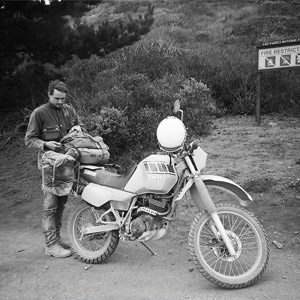The article below appeared in the most recent issue of the magazine and although he is known to many of you, some less internet savvy have been a little perplexed. David Thorne is the creator of some very popular internet memes – most well known is his attempt to pay a gas bill with a drawing of a seven legged spider, you can read it here. Yesterday I came across his latest work, and if you have five minutes, it’s well worth a read (here). The below interview focused on the reaction of online communities to content posted on the internet… A strange topic for us but relevant because of the fear that exists about public opinions in Australian snowboarding. Read on for some experienced notes from Mr. Thorne.
###
This is a nerve racking interview… The last thing I ever want is to end up on one of my favorite websites, 27bslash6.com. I had some epic questions to ask David Thorne about seven legged spiders until I read an answer he gave in an interview on the audience reaction to negative comments online. This is something I thought might definitely interest you guys. To us, the idea of ‘hate’ online is just one person putting an idea or opinion out there that is different to what someone else is thinking. Sure, there might be some name calling and expletives with it, but in essence, that’s what it is and it’s nothing for companies, riders or readers to worry about. David Thorne turned the natural reaction of online communities to his advantage in getting his amazing content to go viral… He is a master manipulator of the internet obsessed for his own (and now our) entertainment.
You have spoken about the fact that negative comments in part drove participation in the viral success of your site. This would be a horrifying concept for a lot of people and brands – can you give us a run down on how that worked for you?
Positive comments about the website are nice to read but they do not drive argument and discussion. I have, on many occasion, gone onto sites such as Reddit and Digg during positive discussion regarding my articles and left comments, under different names, that the content is juvenile and poorly written etc. This drives argument from others who enjoy the content, in effect creating factions that band together to argue and justify their opinion that the site is otherwise. Articles that succeed at driving discussion, argument and factions, are the ones that become popular and therefore viral.
So, given what you’ve just said, would you advise brands to not be so scared of negativity from online communities?
Having all comments positive is static. If there are negative comments left, others will argue and/or justify their preferences and defend that preference in the online communities. A positive comment may be met with a few others agreeing with the statement but a negative one will be met with many people arguing against the comment. For a brand, this engagement is gold.
You’ve proven a few times that you can make something go viral if you want to, what are the most entertaining and successful viral marketing campaigns you have seen online? What about things that have gone viral that are not related to marketing in anyway?
First and foremost, people want to be entertained. The internet allows people to share information that they find entertaining very quickly. Successful marketing campaigns need to treat their product or message as second or third level information to the content. Few will forward a blatant advertisement. Cadbury chocolate have been extremely successful in the last few years with viral marketing and are a good example of entertaining their audience and treating their brand as second level information. I received the ‘eyebrow children‘ video at least ten times from associates before it was even shown on Australian television. Twitter is actually a very interesting site and allows for viral expansion loops in a manner I have only seen touched on in other mainstream sites. The recent ‘Kate’s Party’ comment I made on Twitter was basically a test of this capability and the resulting 72,000 attending guests and television news articles over a forty eight hour period was very interesting.
How about your favourite memes – you mentioned you’re a fan of 4Chan which is like a meme factory – what are your favourite?
Without a doubt, my favourite meme is “I like turtles“. I still use that line to this day on occasion as it makes me smile. And I do actually like turtles. I have one named Carl. Another favourite is the classic Rickroll which friends still get me with. And while I would hardly say I am a ‘fan’ of 4chan, I do find it an extremely interesting environment.
What other sites are you a regular visitor to online?
I am regular visitor to quite a few sites under different pseudonyms, from well known social networking sites such as Reddit and Digg etc. to small forums such as knitting groups. These small, closed community groups can often be more entertaining than the larger ones. I kid you not. Other sites I enjoy include Something Awful (possibly the most entertaining website on the internet), B3ta and even Zoklet.
In my uneducated experience, I see what you’ve done as a great test for viral marketing that isn’t purely a positive message. If the people/brand are unafraid of what people might say (knowing that the people who are dead against your brand or product are not going to be swayed anyway), there’s scope for so much more creativity. You have been in marketing, design and brand identity for years and combined with your experience with 27b/6, is this something you would agree with? Would you advise a client of yours to go in this direction?
In my experience, I have found most clients would be appalled at the thought of negative comments to drive brand or product discussion. I agree that if the client was unafraid of negative comments, and actually welcomed the extreme ones, the scope for creative marketing would be much more open and, in my opinion, successful. I will admit, without naming the client, to recently employing the method of discussing a product in an extremely negative, and in some cases ridiculous, light on several relative websites under assumed names. The responding arguments from people against the statements, saw the new brand name discussed over many months. While it would depend on the product or brand, I would advise clients to consider all aspects of marketing.
The reason I bring this up is that we have an anonymous instant messaging box on our site called The Shoutbox. Predictably, there’s a lot of negative comments – the most spiteful saved for us personally and Pop. It is almost universally hated by our advertisers because it gives our audience an opportunity to comment very publicly on what they’re doing but I have always seen this as being a useful feedback tool (the brands need to listen to what is being said) and it drives interest in what they’re doing. Do you agree or is there something to be said for tighter controls on website commenting?
I agree completely with your analysis of feedback. Allowing discussion, and hopefully argument, engages the reader and propagates involvement. Some form of control of website commenting is needed obviously but I believe it should be a ‘sit back and watch’ system rather than a “delete it before anyone sees it” approach. If I was to comment on The Shoutbox in an extremely negative way, your regular readers would jump in to defend their preferences. This creates factions that feed off each other and reinforces their opinions that the opposite of my ‘ridiculous’ statements are correct. Ownership of a brand by consumers is highly sought after by marketers and creating factions, united against a common foe, is one way that it can be quickly established.
Have you ever had one of your email exchanges go badly wrong? What happened?
There are many emails that do not get posted simply because the other party stops responding or tells me to get fucked early on. There is no way to know if the correspondence will continue, and even if it does that it will be well received by later readers, so you have to enjoy writing and do so to entertain yourself foremost. I have overstepped the mark a few times though, most recently when I posted a fake internal memo from McDonald’s, regarding the implementation of short-changing customers as a procedure. A few days later I was actually arrested for fraud and had my computer equipment taken for evidence under e-crime legislation. I was hoping Ronald McDonald would appear personally in court but it was just some old guy in a bad suit.
Your son sounds like he is somewhat following in his fathers footsteps – I can see him publicly pranking you sometime soon. That gag on Twitter about Bubbles was all time (Offspring asked if I enjoyed blowing bubbles when I was young. Said yes. He replied “well bubbles is back in town & wants your number”). Is he in on the joke? Does he find it funny or are you just an embarrassing dad to him?
Coincidently enough, while walking my son into school a few weeks ago he said the dreaded words “try not to embarrass me” for the first time. While I do not encourage my offspring to be a smartarse, I do encourage creativity and questioning authority. Hopefully at the same time. The ability to laugh at yourself and find the humorous side of difficult situations is important at any age and I figure it is better for him to learn early in life how much he can get away with and to deal with the repercussions of crossing lines. As I have the maturity of a ten year old and my offspring is ten going on twenty, we are generally amused at the same things. Recently, after I revealed to him that he had just eaten octopus, he stated “When you are really old and can hardly move, I am going to hold you down and make you eat poo”, a few days later, following an extremely bad home haircut, he stated “When you are really old and can hardly move, I am going to hold you down and cut off all of your hair. And then make you eat poo.”
I couldn’t find any mention of you on your long time employer, de Masi jones’, website… Any chance they’re trying to distance themselves from you? Ahaha
I would like to think that due to the fact I spent several years there and was responsible for all of the major clients, they have deleted all profiles in an attempt to disguise the fact that I am no longer there. I resigned from the position of design director earlier this year to concentrate on things more interesting than making the type on clients business cards bigger or pretending to be interested in the boss’s latest hair style.
The third edition of David’s book, The Internet Is A Playground, is available now through all good bookstores – it is definitely worth picking up a copy. Fontaine Press (ISBN: 97080980672947) – $24.95





































